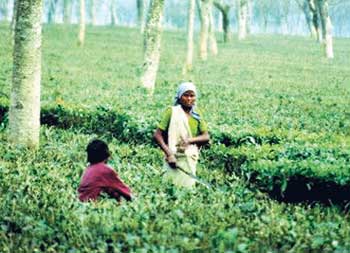
Is Sri Lanka facing an economic crisis?
On the eve of the new year Government announced a significant increase in LPG the commonly used source of cooking gas in the country(said to be used by 30% of the population) and number of essential commodities such as dhal, gram etc, official inflation rate however recorded a decline. Globally the oil price hit the 100 USD mark indicating further complications in the energy costs. New Year gave little hope for people whose disposable incomes are under heavy strain. On a positive note tea prices continued to improve with Colombo Auction reaching a near 3 USD/kg mark, prices rose sharply in December owing to disruptions in Kenya. It is most likely that Sri Lanka’s “green gold” will net US$1 billion in 2007. According to the Central Bank despite worrying upheavals in the second half Sri Lanka Rupee depreciated by les than 1% in 2007 and a balance of payment surplus for the year is expected to be around US$ 500 million. The financial sector produced good results given the rising interest rates and the corporate earnings too improved while the Colombo Stock Market haven’t shown much negative sentiments. But deeper in to the country there is an absence of the FGF (Feel Good Factor) and the small and medium business sector seems to be reeling under pressure. One small time entrepreneur running a computer service centre told me that he is now seriously considering closing the business as he is unable even to recover the monthly rent for premises, his explanation was simple- the majority of people are now postponing expenditure that they do not consider as essential and the IT sector becomes an immediate casualty. Another is an established businessman who ran a thriving iron works industry, he too was of the same opinion and said that recovering dues are becoming extremely difficult. The small businessman too is planning to put up shutters. While the authorities speak of the growth factor this appears to be the grim reality at the grass roots level. It is this Small and Medium Enterprise (SME) sector that feeds many mouths, create employment. Given the global crisis in energy and food there is very little government could do in the short run, most they could do is to curtail waste and public expenditure and provide relief to the poorest. According to a recent media report it is said that the government is taking steps to set up a new procurement body and a state Trade Wholesale company with the objective of lowering the prices of essentials, intervention of the government in a crisis is welcome but government getting in to trade may not deliver the desired results. History has clearly shown why and how government agencies such CWE, State Trading Corporation, Air Lanka and State Plantations, etc failed miserably and ultimately had to depend on public funds even to meet the monthly payroll costs. Eating in to the public funds for basic survival beats the very purpose of state getting involved in commercial operations. Government corporations on most occasions are run by Boards appointed on the basis of political loyalty than for meritocracy or competency and more often than not they are used for politically motivated events and wasteful tamashas. Today we do not have such honest committed strong administrators like A N. S. Kulasinghe(Ports/Engineering), Prof Senaka Bibile(Pharmaceuticals),Wimal Amarasekera (Ports) to name a few who served public institutions with distinction for the benefit of the people and not for the political interests. We are well aware that the CWE retail shops and co-operative movement once served the interests of the poor well but in today’s context it would be hard to imagine whether desired results could be achieved. Government revenue such as import duties and value added taxes need to be imposed and raised periodically due to loss of tax revenue in other areas and heavy government expenditure that does not yield returns. This is one of the principal causes why government has to go in to arbitrary price revisions when world prices increase. Today India is surging ahead as an emerging global giant with a sustainable economic growth and a clearly identifiable improvement in quality of life. India too has a fair share of problems in terrorist threat of naxalites, hung parliament and razor thin majority with communist party of India at times holding ruling congress to ransom, internal conflicts among different communal groups, and diplomatic rows with neighbours etc. But India is a stable country in the eyes of the world as a well governed economy. Increasing foreign investment has strengthened the Indian Rupee. Investors necessarily do not look for best business environments; they prefer not so good business environments due to its low cost entry. Given the increasing effects of globalisation good governance and diplomacy plays a key role in obtaining benefits for people. |
|
||
| || Front
Page | News
| Editorial
| Columns
| Sports
| Plus
| Financial
Times | International
| Mirror
| TV
Times | Funday Times || |
| |
Reproduction of articles permitted when used without any alterations to contents and the source. |
© Copyright
2008 | Wijeya
Newspapers Ltd.Colombo. Sri Lanka. All Rights Reserved. |
